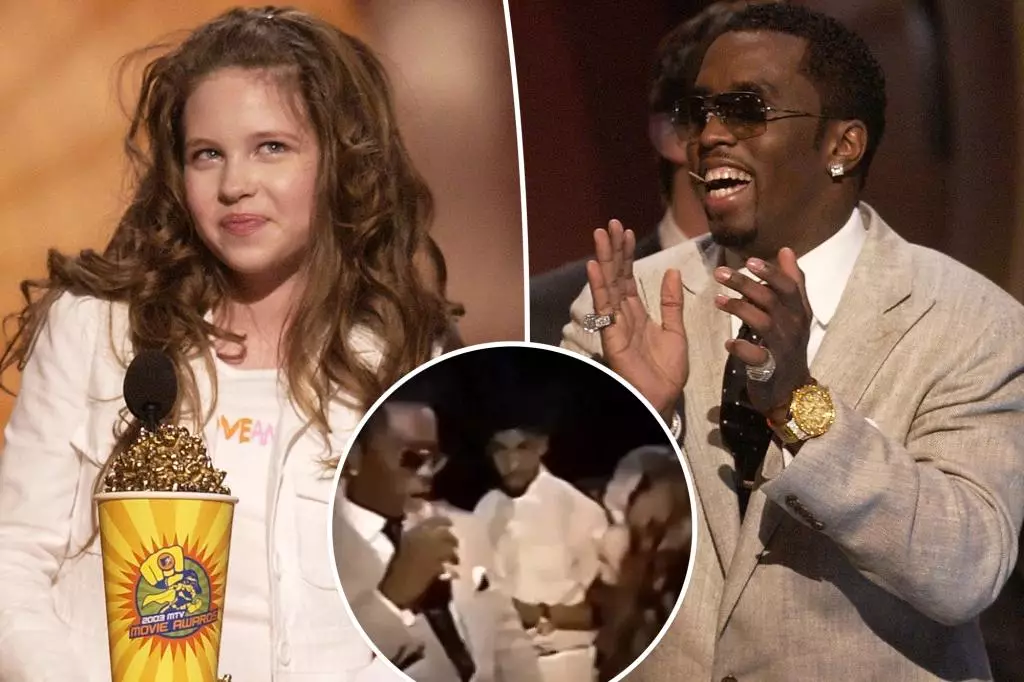In an era where every moment is captured and scrutinized, a resurfaced video of Sean “Diddy” Combs has ignited a firestorm of debate and concern. The clip, filmed during the 2003 MTV Movie Awards, shows a then 33-year-old Combs inviting a 12-year-old Daveigh Chase to an afterparty. As he approaches her, drink in hand, the notorious party boy’s demeanor is playful and mischievous. This moment carries a weighty context today, considering the grave allegations of sexual misconduct against minors that have emerged against the music mogul. The juxtaposition of innocence and predatory implications in the video raises questions that resonate deeply within cultural and legal frameworks today.
The invitation, seemingly benign in the moment, has since become a focal point for criticism and concern. Many are looking back at moments like these with a newfound awareness of power dynamics and the protection of vulnerable individuals, especially children, in the entertainment industry. Some social media users have expressed horror at the content, reflecting on how these moments take a darker hue in hindsight.
The allegations against Combs are severe and paint a troubling picture of an individual embroiled in significant legal issues. As he faces multiple charges, including sex trafficking and sexual assault against numerous minors, society must grapple with the complexities of celebrity culture that often enables such behavior to persist unchallenged. The resurfacing of the video featuring Chase adds a layer of gravity to an already intense situation.
The references to Chase’s previous encounters with Combs and rumors about Ashton Kutcher, who presented her award that night, also invite scrutiny into the broader cultural context at the time. In a time when Hollywood parties often blurred lines of propriety, the video encapsulates an environment wherein adult figures, especially influential celebrities, had unchecked access to children. The contrasting experiences of Chase, who became famous for her role in “The Ring,” and the shadowy implications surrounding her interactions with Combs, indeed speak volumes about the nature of celebrity and its consequences on youth.
Social media acts as a double-edged sword in the revelation of such controversial subjects. On one side, platforms provide a means for voices to be amplified and for uncomfortable conversations to occur; on the other, the immediacy of viral content can sensationalize real issues without the necessary nuance. After the video resurfaced, many users turned to Twitter (now X) to voice their disdain for Combs, encapsulating a collective outrage that has become all too common in today’s digital culture.
Comments like, “Imagine what happened behind closed doors. I hope they lock him up for life!” illustrate the visceral reactions that these revelations can incite. This public reaction not only reflects a broader societal distrust of powerful figures in Hollywood but also underscores a growing insistence on accountability. The gravity of Combs’ situation compels a societal reflection on the past, as well as ongoing discussions on how to best protect the vulnerable, particularly performers at the infancy of their careers.
As Combs’ legal battle looms, taking center stage in May 2025, the mounting allegations will undoubtedly contribute to the scrutiny he faces. His recent arrest and the extensive charges against him set the stage for what could be a historic trial concerning celebrity culture’s accountability to its victims. The details surrounding his charges, including accusations related to numerous minor victims—including a reportedly 9-year-old girl—will factor into an increasingly polarized narrative about childhood exploitation.
In a plea for transparency, Combs’ legal team has requested that the identities of the accusers be made public, presumably to mount a defense against the allegations. This request is indicative of the high stakes involved, as both a public figure and a father of seven, Combs is under tremendous pressure as the implications of these allegations could fundamentally alter his legacy.
As these stories unfold, it is essential to extend the conversation beyond headlines and social media snippets. The narrative surrounding Sean Combs serves as a crucial case study into systemic issues regarding the treatment of minors within the entertainment industry. It beckons a more responsible discourse regarding the power dynamics at play and calls for a collective commitment to address the underlying issues of exploitation and safeguarding the innocent.
In examining the complexities of this case, and reflecting upon the cultural impact of celebrity, it becomes evident that we must foster deeper conversations aimed at cultivating an environment where accountability is no longer optional, but a fundamental expectation. The responsibility, ultimately, lies within society to ensure that the voices of the vulnerable are not drowned out by the allure of fame, and that we do not turn a blind eye to the shadows lurking behind the glitz.
